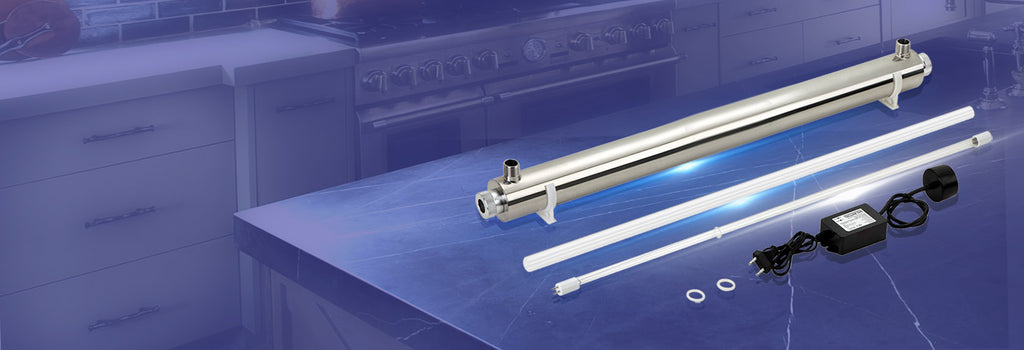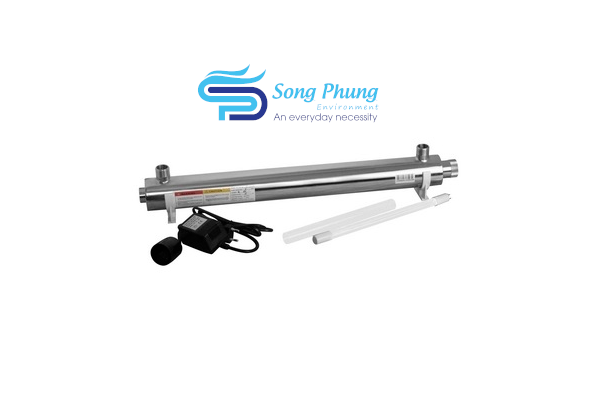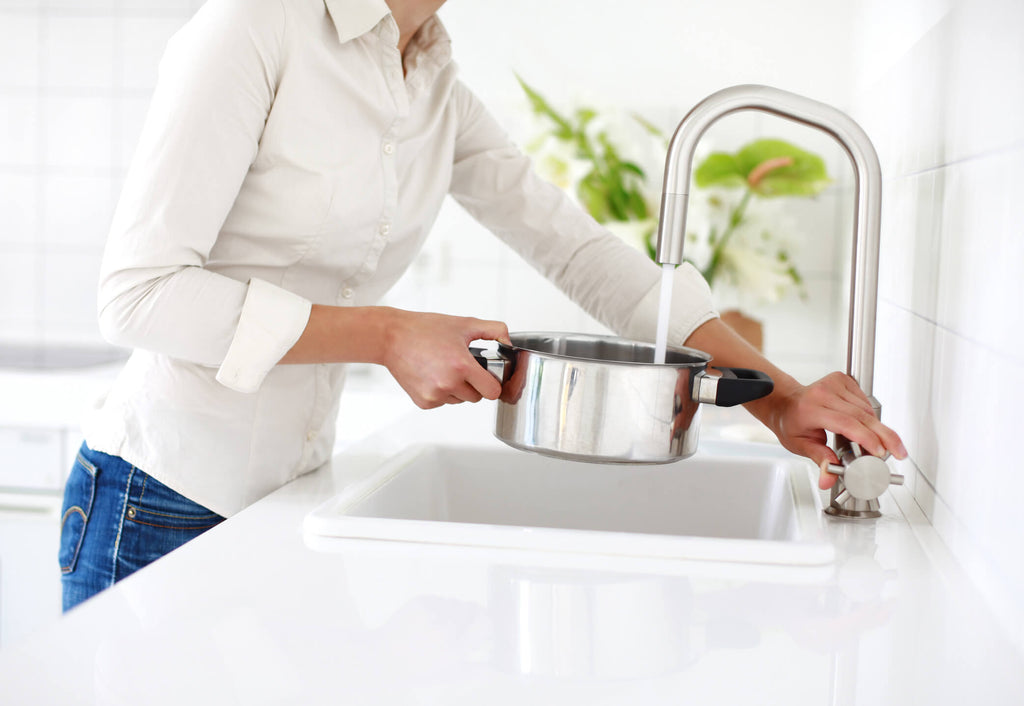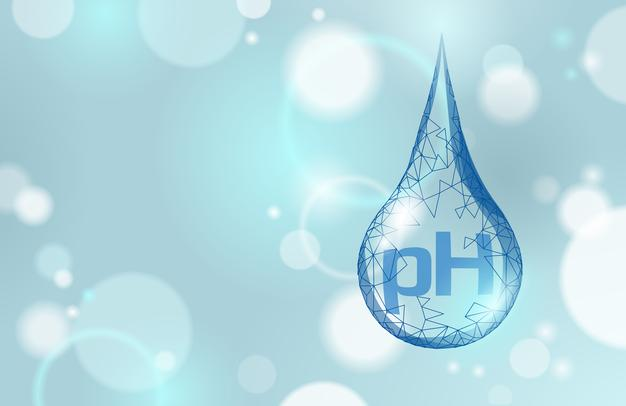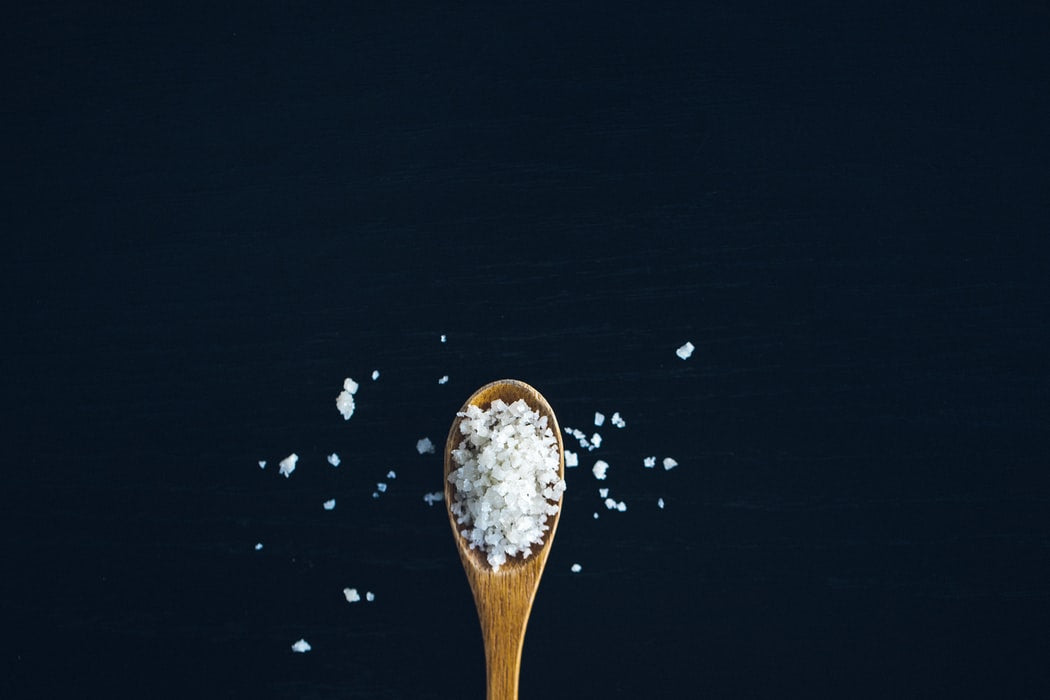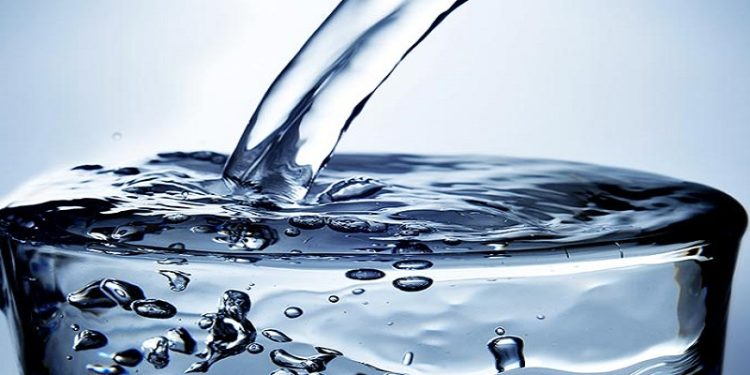The most effective ways to soften hard water today
“What is hard water?”, “how to soften hard water?” These are questions that many people often ask. Hardness water is a type of water that contains minerals and chemicals, so it causes many negative health effects, contributing to the increased incidence of cardiovascular problems, diabetes, decreased fertility, etc. To know specifically what hardness water is, how to soften temporary hardness water as well as how to soften permanent hardness water, please follow the article below!
What is hard water?
Hard water is water with high mineral content (as opposed to soft water) containing more than 3 mg/l of Calcium(Ca2+) and Magnesium (Mg2+) cations. Hard water is formed by the process of water seeping through layers of limestone, chalk or gypsum, but hard water is mainly formed from Calcium, Magnesium Carbonate, Bicarbonate and Sulfate.
In fact, water with a lot of Ca, Mg, the hardness of the water will be high, and vice versa, if the water has less Ca and Mg, the hardness will be low. If it contains a lot of magnesium, the water will taste bitter.
If drinking water is hard water, it can be beneficial to health, providing more minerals for the body but can seriously affect the industrial environment, waste fuel, affect cooling towers, boilers steam and other water treatment equipment.
Therefore, the way to soften hard water is always the solution that many businesses are looking for and applying.
According to USGS (US Geological Survey), water hardness is determined by the concentration of Ca2+, Mg2+ that exists in water. The basic limits are:
- Soft water: Hardness from 0 to 60 mg/l (milligrams/liter).
- Moderately hard water: Hardness from 61 to 120 mg/l.
- Hard water: Hardness from 121 to 180 mg/l.
- Very hard water: Hardness > 180 mg/l.
What is soft water?
In contrast to hard water, soft water is water containing very little Ca2+ and Mg2+ ions. As a result, soft water is preferred by many households as well as factories and enterprises because it does not cause scale damage to water equipment in the house.
For example, distilled water, rain water, and domestic water are filtered by a borehole water filter tank, and a water purifier is a form of soft water.
Soft water has many benefits such as:
- Helps protect skin, keep hair clean and softer.
- Clothes are washed more cleanly.
- Save soap, soap, detergent, etc. when washing.
Hard water classification
Hard water contains a lot of cations, so people often rely on the concentration of these cations to classify hard water into 3 main types: temporary hard water, permanent hard water and total hard water.
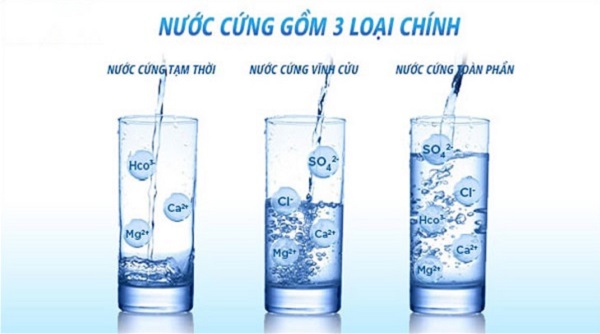
What is temporary hard water? Temporary hard water softening method
Temporarily hard water is water that is rich in ions: Ca2+, Mg2+, HCO3–. If you want to temporarily soften hard water, you can use boiling water to break down the salt intoCO22-. Besides, you can also use temporary hard water softeners such as: NaOH, Ca(OH)2, Na2CO3, Na3PO4 by adding softeners to the water, then filtering the precipitates formed.
What is permanent hard water? How to soften permanent hard water
Permanent hard water is water that is rich in ions: Ca2+, Mg2+, HCO3–, Cl–, SO24-. Permanent hard water cannot be softened by boiling like temporary hard water but must use permanent hard water softeners (chemical method).
For example: Add (Na2CO3) to water or use an ion exchange method as a way to soften permanent hard water and temporary hard water.
What is total hard water? How to soften hard water completely
Totally hard water is water that possesses both properties of permanent hard water and temporary hard water, including salts ofMg(HCO3)2,Ca(HCO3)2 and MgCl2. To soften hard water completely, you can use the same ways to soften permanent hard water and temporary hard water in the content above!
What causes hard water?
Hard water is formed by groundwater passing through layers of soil, rocks, limestone, etc. to dissolve Ca2+, Mg2+ ions, etc. present in rock and soil and increase hardness in water. Currently, there are many researchers who have created their own hard water by chemical methods, then searched for ways to soften the hard water.
Besides, the increased water hardness is also affected by the TDS index in the water. The TDS index will affect the concentration ofMg2+ and Ca2+ ions to rise.
>>> Learn more: What is domestic TDS? Based on TDS index to design water treatment system.
Harms of hard water
Hard water contains many mineral ions, the composition of minerals is about 100 mg/l, which is very good for health. Therefore, when drinking this water, our body will be added with many beneficial minerals.
However, water with high hardness will greatly affect human health and living and production activities, etc. Like TDS, hard water with low hardness is very beneficial to health but if it is too high, will cause many harms.
For daily life and production
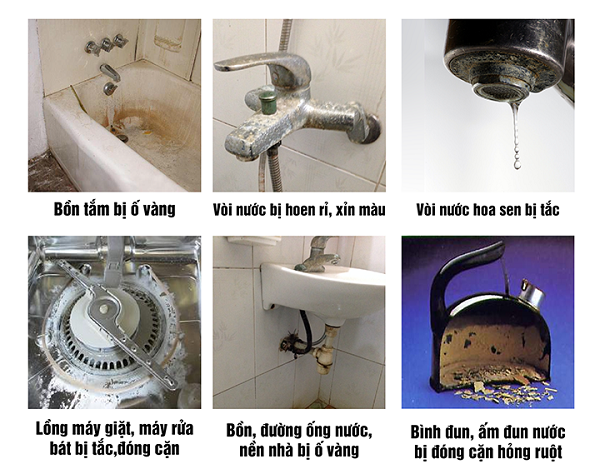
The first harm is that hard water reduces the ability of soap to foam because hard water does not dissolve soap. When washing clothes with hard water, it also causes the fabric to fade quickly and reduce quality. In addition, on the clothes there are still stains and undissolved soap powder.
If the equipment in the bathroom is not rusted, calcified, it means that the quality of your family’s water is very good, otherwise if the above phenomena are present, the water source you are using is hard water.
In addition, hard water also clogs water lines due to long-term accumulation of residue, creating yellow stains on many household items. Therefore, you will lose a few more costs for repairing pipes or replacing accessories when not treating hard water in a timely manner.
Therefore, many families have to use automatic water softeners to ensure the water source is always safe for health and other devices in the family.
Harms of hard water in daily life
Cooking with hard water will make the food take longer to cook, reduce the taste and not be fresh. Especially when making coffee or tea, you will notice that the water after brewing has a darker color, the smell of coffee / tea will be less aromatic, the taste is not as pure as using pure filtered water.
For health
Water with high hardness is not beneficial for human health. Permanent hard water has little effect on human health, but temporary hard water is much more. Therefore, applying the method of softening permanent hard water and temporary hard water is extremely necessary.
Hard water does not dissolve with soap, but it will create residue on the body, so when you use hard water to shower for a long time, it will cause dry hair, dry skin, allergies, rashes, even Even dermatitis if you don’t wash your skin.
In addition, the concentration of minerals that exist in temporary hard water also affects health when you drink it. High levels of calcium and magnesium can affect several organs in the body, increasing the risk of cardiovascular disease. The whole family water purifier can remove the hardness in the water, helping us no longer worry about pathogens from hard water.
According to some studies, people suffering from heart disease and high blood pressure can be attributed to drinking hard water. In addition, hard water is also a cause of diseases: clogged arteries / veins, kidney stones, urinary stones. When decocting Southern medicine, Northern medicine, if you use hard water to decoction, the ions present in hard water will reduce the effect of the drug, and even cause some dangerous side effects.
In industrial production
- For the textile industry: Hard water will greatly affect the dyeing quality and finishing of the product. Hard water will make the fabric fibers rough and hard, reducing the quality of the product.
- For the beverage industry: If hard water is used in this industry, it will change the color and taste of the product. Businesses will have to pay a high amount of money to apply the hard water softening method for the industry, which is to invest in a system to reduce water hardness.
- For boiler, boiler, and cooling tower equipment: Hard water can corrode the cooling tower, create deposits in the boiler, cause water to clog pipes, increase pressure in the pot and pipes, and lead to the risk of fire/explosion. In addition, the residue in the boiler also consumes a lot of electricity, reducing the life of the equipment.
5 Simple and effective ways to soften hard water
Here are some simple to complex hard water softeners that will solve all your problems.
Before applying the permanent hard water softener or temporary hard water softener, you need to understand the hard water softening principle that is to reduce the concentration of Ca2+ and Mg2+cations in hard water.
How to soften hard water by boiling water (heat method)
Boiling water is only suitable for households to treat hard water for living and eating purposes. When boiling, you should let the water boil for a few minutes to ensure that the harmful substances Mg and Ca are removed. Then you use the settling method to remove the residue and get clean water. When the water boils, you just need to let it sit for a few minutes and the sediment in the water will settle.
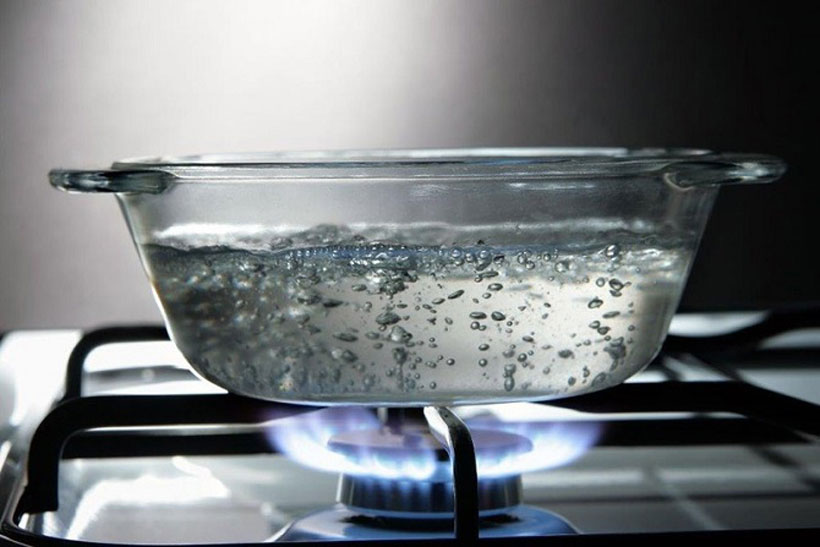
How to soften hard water by ion exchange
For drinking water, ion exchange method is commonly used. It works by removing Calcium and Magnesium ions from water and replacing them with Sodium or Potassium ions covered by ion exchange resin beads.
Hard water treatment systems need to be cleaned approximately once a week to replace used water softener ions and remove ions in replaced hard water. The hard water treatment method with ionic resin is the most commonly used hard water softener method because it is cost-effective from investment costs to operating costs. kf
How to soften hard water with chemicals
Chemical softening of hard water is widely used in industry. This method will mix different chemicals into the water to combine with Ca2+ and Mg2+ ions to form water-soluble compounds so that when used, it will be less likely to stick on the walls of pipes and boilers.
Note: This method should only be applied in industry and production, not in domestic water treatment, because chemicals will adversely affect human health.
Use water filter materials to soften hard water
Water filter materials are intermediate products capable of completely removing impurities, dirt and water contaminants. Currently, on the market, there are many types of specialized water filter materials such as manganese sand, activated carbon, quartz sand, filter porcelain… The advantage of this method is cost savings and high efficiency. However, this method is only suitable for domestic applications to treat domestic water.
How to soften hard water with a water purifier (RO reverse osmosis)
Reverse osmosis is a process that forces water to pass through a series of filters under high pressure to filter all impurities out of the water. The water obtained is almost distilled water, all chemicals, dissolved solids, Ca2+ ions, Mg2+ are removed.
However, with most water purifiers, the RO system only serves to purify the drinking water in the home. Because hard water still passes through the pipe system and damages the equipment in the house.
The process of softening permanent hard water still has deposits at the RO membrane. So to ensure that the hard water softener is always working, you must periodically clean the RO membrane with specialized chemicals.
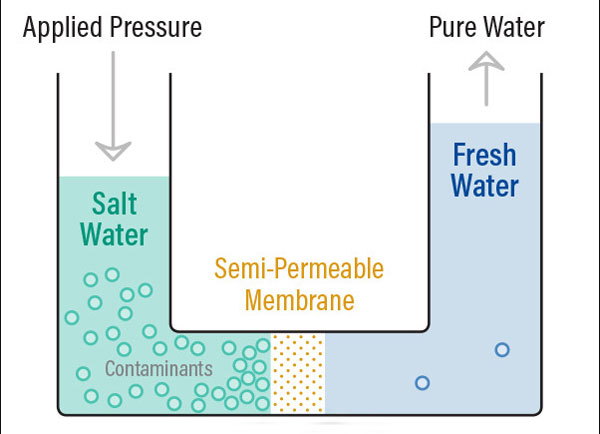
>>> RO water purifier products you can refer to:
- 50GPD household RO water filter.
- 100 GPD home RO water filter.
Above, Song Phung Environmental Company has specifically answered the question “what is hard water?”, “how to soften hard water?”. If your home water source is hard water, please contact us for detailed advice on RO water purifier products that help soften hard water, serving your family’s daily needs!
How to calculate water softener? Let see more by utility:
Translator: Duong Nguyen Hoang Khang

